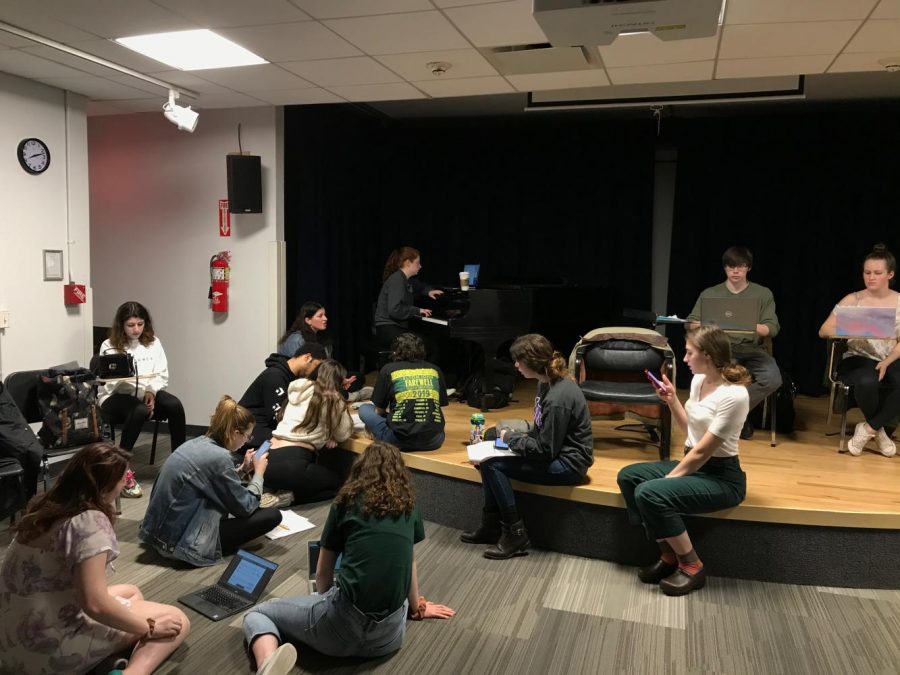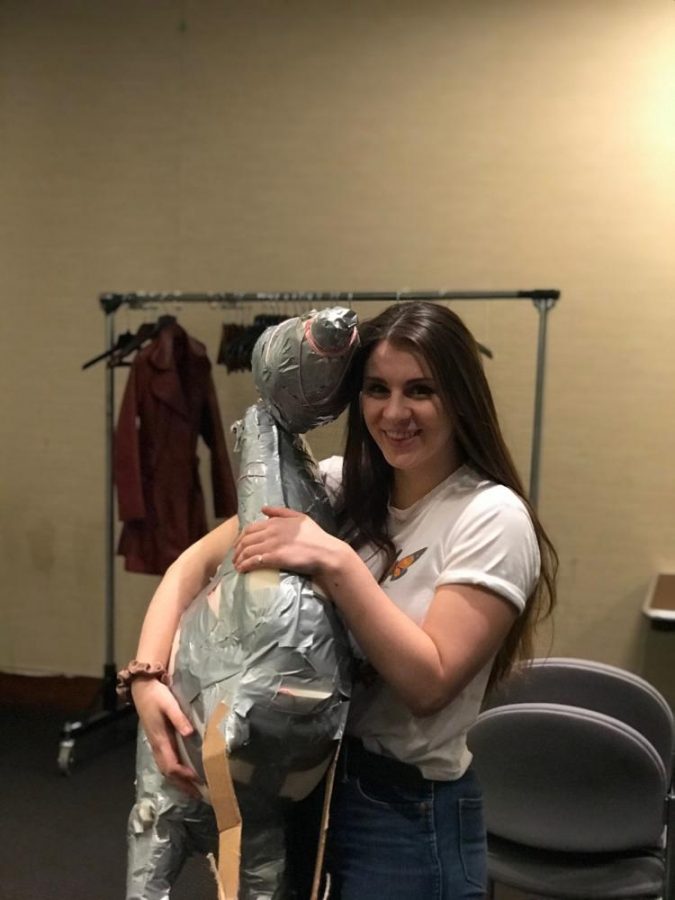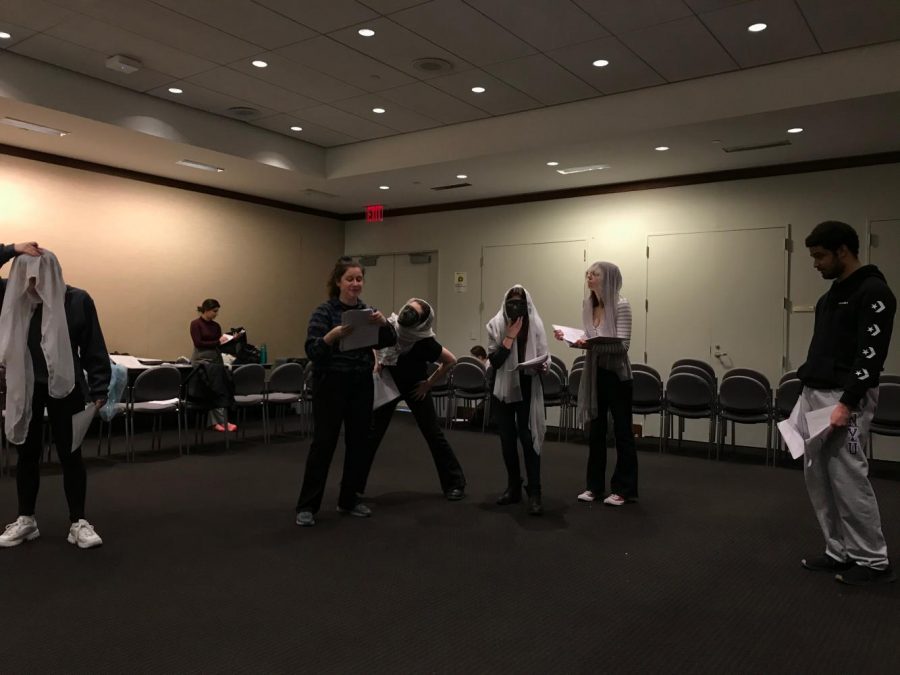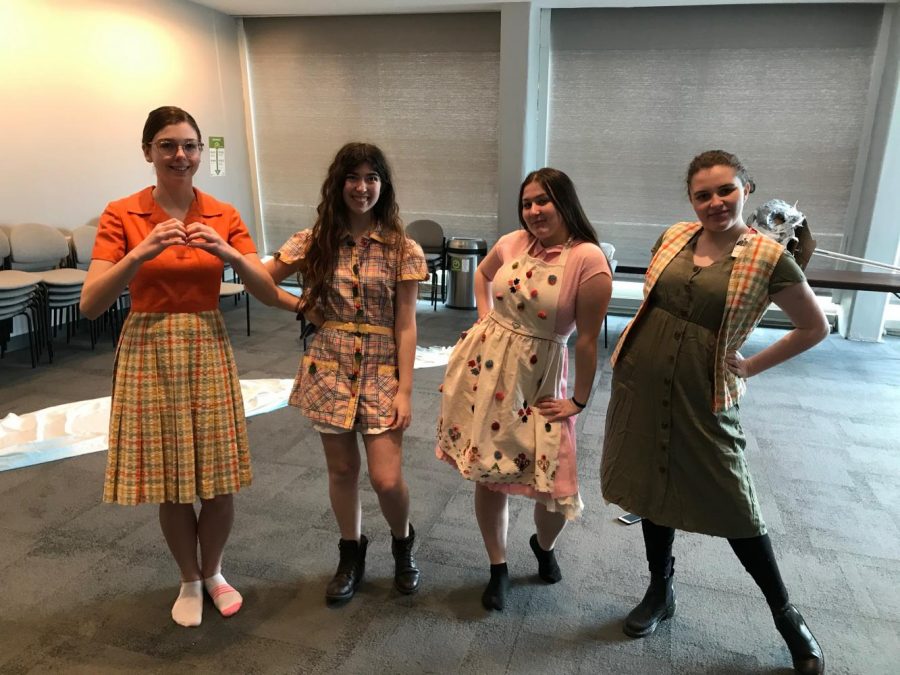
Amid the buzzing chatter, mountains of pastel dresses and larger-than-life puppets, one would have found producer Keith Morris and assistant director Jules Talbot leading a typical rehearsal in Kimmel Center for University Life for Uproar Theatre Corps’s “Gallathea” before the COVID-19 pandemic led to a campus shutdown. While many artists were forced to abandon their projects, Morris and Talbot refused to walk away from their unique musical and are willing to do whatever it takes to keep the show alive by delaying the performances until the fall.
The team tackled strenuous obstacles in the creative process long before they even thought about auditions. At the beginning of the school year, Morris originally hoped to put on “Sweet Charity,” “Bat Boy: The Musical” or “Bare: A Pop Opera,” yet was left with no choice but to start from scratch when he was informed that Steinhardt cut their production budget by a third, down to $1200. Consequently, Steinhardt’s Uproar Theatre Corps was not able to afford rights to a musical, leading Morris and Talbot, a Steinhardt junior and Gallatin sophomore respectively, to transform a public domain play into a musical by composing original music.
Unsure of what play to select, Morris sat down with Talbot over Thanksgiving break. The latter immediately recommended “Gallathea” due to her fascination with its subliminal queer writing. The public domain play would also allow them to adapt it into a musical without any problems.
A lesser-known 16th-century play by John Lyly, “Gallathea” tells the story of a village that must sacrifice a virgin to the Roman god Neptune or else he will drown everyone. Out of the fear of being selected as the sacrifice, the titular character, Gallathea, disguises herself as a man and hides in the woods where she meets her love interest Phillida, another disguised female virgin.
The pair did not want to settle for Lyly’s original script and felt comfortable with reworking it to obtain the desired message. While “Gallathea” hints at the idea of queerness, Talbot believed that Gallathea and Phillida’s love story should be central to Uproar’s production. She began to question the play’s structure, specifically regarding why the two woman characters did not have larger roles considering that they were central to the plot. To emphasize the show’s inherent queerness, Talbot shifted the story’s focus to the two women lovers.
Focusing on a queer love story, the creative team wanted the story to illustrate how disguise complicates physical and emotional attraction.
“How can their love be between them as people from the jump and the disguise be sort of an obstacle towards discovering [this attraction],” Talbot questioned. “How can this be something, but gear it towards people who relate to it and see themselves in these characters, which I think is a departure from its intention at the time of its creation?”
To execute this vision, Morris and Talbot immediately decided to cut an irrelevant subplot and two characters that distracted from the queer love story. When rewiring dialogue, the duo put the original dialogue in conversation with their rewrites. As for raising the stakes, they also incorporated Neptune’s monster, which never actually appears in the original script, into the production.
“It is such a waste to have a monster in the play and never use it,” Morris said. “So that was when we introduced the idea that Neptune knows what’s going on and has the power to send the monster after these two girls who are in disguise.”
As a result, Talbot designed a puppet that the actor playing the role can wear.

Despite both creatives having minimal experience writing songs, Morris and Talbot wrote their own lyrics for all 10 original songs. When they had the first draft of a song, they would send it to one of the three composers involved with the production: Steinhardt almuna Rai Arsa Artha, Marymount Manhattan alumnus Craig Long and Bill Morris, Morris’ father. Afterward, Morris and Talbot would receive music samples and rewrite any lyrics that did not match the melodies.
“It really is an improvised process because they are going to be getting sheet music that does not detail their part and their job is going to be to create something that really does sound organic and beautiful,” Morris said.
Alongside creating a musical from scratch, the duo had to assemble an entire production team. While the show’s extreme interdisciplinary nature may seem daunting to some, Morris and Talbot thought that they might have had their work cut out for them when it came to forming the creative team.
“There aren’t a lot of folks out there who are as interested in Shakespeare as they are in musicals,” Morris said. “The people we do have working with us are very much as passionate about these intersections of things as we are.”
After two days of auditions and a day of callbacks, the creative team was able to assemble a primarily female cast that was prepared to take on the challenge and worked well together.

With a complete cast, “Gallathea” went into rehearsals the second week of February. About four times a week, the creative team worked with cast members on their blocking, dialogue, singing and overall understanding of the show.
As the music directors taught the original music to the performers, Morris and Talbot would decide what lyrics they disliked and immediately generate new ones, demonstrating the amount of flexibility original theater requires from its creators. The two would then give the rewrites to the performers to try and repeat the editing process until they were content.
Despite the delay of the production, the cast will mostly stay the same except for the graduating seniors. Morris and Talbot plan to recast the vacant roles in the near future. As for rehearsals, the two will continue to rehearse with the performers on Zoom and hopefully in person during the summer, if the situation permits them to do so.

While Morris and Talbot collaborated on the script and lyrics, rehearsals showcased their individual but complementing talents. Morris could be found leading actors, designing costumes or sets and creating rehearsal schedules while Talbot focused on the script and puppet design.
As a dramaturg, Talbot’s role included studying the play’s script in addition to its historical context and to better coach the performers.
“Most of my stuff has been either production work on puppets or in the room, I am usually on book and am available for dramaturgy work with the actors,” Talbot said. “When Keith isn’t using an actor, I will take them aside and work through their monologues or their scene work in general because, for a show like this, an understanding of the text is really foundational.”
For design, both Morris and Talbot envisioned how they could represent queer identity without overstating the idea.
“Design is always where I start,” Morris said. “If I can’t see or imagine what they’re going to look like or what the world they are existing in will be, it’s really hard for me to tell them how to behave and instruct them how to come to life.”
Yet after a few rehearsals, the two realized how much their vision changed. From an over-the-top, glitzy production, the two eventually became fond of a more pastoral, antique aesthetic. Since the show is set in a forest, the set is supposed to feature lots of trees and animals. Yet, this is no ordinary forest. Instead of wood, the trees will be made of wire and twine while the deer will look like patchwork quilts. Due to the impact of COVID-19, these unique set pieces in addition to the show’s props and costumes are being stored in the Steinhardt Education Building’s basement.
“Gallathea”’s sound design is completely ensemble-driven. Every sound in the forest, like lightning and thunder, will be made by the actors using their voices and body percussion instead of any technology.

Despite the pandemic, the company of “Gallathea” plans to perform their show at the beginning of the fall semester. All of their music, designs and direction will remain the same as long as they can secure Steinhardt’s Black Box Theater, the original venue, in the fall. The creative team is still unsure if the space will be available then, especially with the potential of a remote fall.
“Everything happens for a reason,” Morris said. “That is a theme in the show. There is this idea of finding a reason for your birth, finding a reason for your life … This is a unique situation for us in that no ties are keeping us down from continuing. ‘Gallathea’ happened for a reason. Even in the face of this crisis, it will not be held down. We are going to have our day.”
When Morris and Talbot first learned about the remote learning conditions in March, they were unsure of what they should do next and even questioned if they should save the show. Yet every artist involved was so devoted to “Gallathea” because of it queer love story that they informed the duo that they did not want to stop. With nothing but support from the company, Morris and Talbot recognized that every challenge prior to selecting “Gallathea” was perhaps meant to be because it guided them to transform an outdated piece of theater into something much more complex and relevant. To them, COVID-19 was just another obstacle, but Uproar Theatre Corps has come too far to give up on the show now. With this resilience, the company is determined to have an audience witness “Gallathea.”
While the pandemic has left many artists feelings dejected, Morris demonstrates an incredible amount of perseverance in the face of adversity. The company of “Gallathea” refuses to give up on their production even if it means that they will have to perform a few months later than anticipated or not at all because they are all so passionate about the show and its message. To them, “Gallathea” is more than a show; it is an experience destined to challenge the dominant discourse regarding Elizabethan theater and heteronormativity, proving that truly anything can change, no matter how difficult.
Email Sasha Cohen at [email protected]. Read more from Washington Square News’ Spring 2020 Arts Issue.






















































































































































